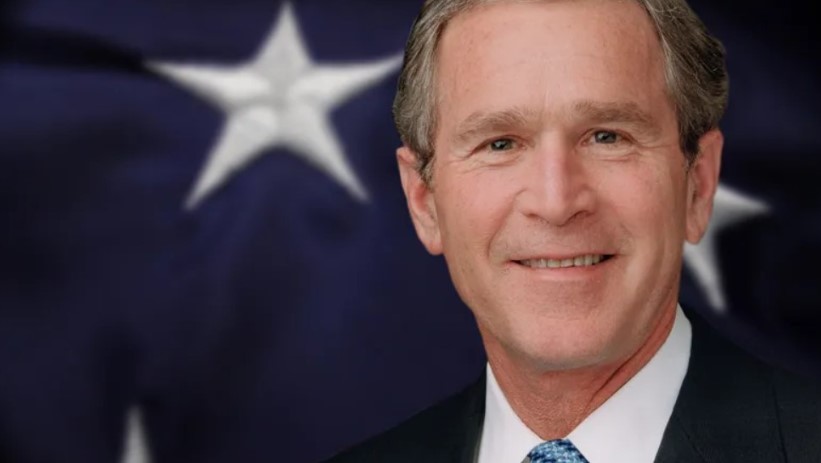George W. Bush’s phone number, contact information, fan mail address, and other contact information and details are all provided on this page.
George W. Bush, was born July 6, 1946, New Haven, Connecticut, United States, 43rd president of the United States (2001–09), who was in charge of the country’s reaction to the September 11 terrorist attacks in 2001 and was the driving force behind the Iraq War in 2003. President George W. Bush became the first person since Benjamin Harrison in 1888 to be elected president despite losing the national popular vote when he won the electoral college vote by a narrow margin over Vice President Al Gore in one of the closest and most contentious elections in American history in 2000 over Vice President Al Gore. President George H.W.
Bush was a businessman and governor of Texas from 1995 to 2000 before being elected to the White House. Early life Bush was the oldest of six children born to George H.W. Bush, the 41st President of the United States (1989–1993), and Barbara Bush. He was the eldest of six children born to George H.W. Bush and Barbara Bush. Prescott Bush, his paternal grandpa, served as a United States senator representing Connecticut from 1952 to 1963. The younger Bush grew raised mostly in the Texas cities of Midland and Houston. He attended Phillips Academy in Andover, Massachusetts, from 1961 to 1964, the same boarding school from which his father had graduated. In 1968, he graduated with a bachelor’s degree in history from Yale University, which also happened to be his father’s and grandfather’s alma mater. The head of his fraternity and a member of Yale’s secretive Skull and Bones organisation, like his father, Bush was an average student who did not thrive in sports.
Unlike his father, Bush was a poor student who did not succeed in athletics. A pilot trainee position in the Texas Air National Guard became available to Bush in May 1968, just two weeks before his graduation from Yale and the expiration of his student draught deferment. Air National Guard members were less likely than regular soldiers to serve in the Vietnam War at the time of Bush’s application. He was promoted to the rank of second lieutenant in July 1968 and received certification as a fighter pilot in June 1970.
In the autumn of 1970, he petitioned for admission to the University of Texas School of Law, but was denied entrance due to a lack of qualifications. Despite the fact that Bush seems to have skipped at least eight months of military service between May 1972 and May 1973, he was given an early release in order to attend Harvard Business School in the autumn of 1973, which he did. During both the 2000 and 2004 presidential elections, his patchy service record was brought up as a campaign point of contention.
The next year, Bush returned to Midland, where he began working for a Bush family acquaintance who was an oil and gas attorney, and eventually went on to establish his own oil and gas company. In 1977, he tied the knot with Laura Welch, a teacher and librarian from Midland. When Bush was defeated in his bid for Congress in 1978, he committed his time and energy to growing his company. Bush was able to recruit a large number of famous investors with the assistance of his uncle, who was at the time gathering cash for Bush’s father’s candidacy for the Republican presidential nomination.
Following a period of adversity in the early 1980s, the firm was eventually bought by the Harken Energy Corporation in 1986, following the final fall of oil prices. Bush got Harken shares, as well as a position as a consultant to the firm and a seat on the board of directors of the corporation. Bush stopped off drinking alcohol the next year, just after celebrating his 40th birthday. After reflecting on the situation, he admitted: “I understood that alcohol was starting to crowd out my energy and may, ultimately, crowd out my feelings for other people.” His choice was influenced in part by a self-described spiritual awakening and deepening of his Christian faith that began the previous year, after a discussion with the Rev. Billy Graham, a Bush family friend, and continued throughout the year.
The next year, Bush moved to Washington, D.C. to serve as an advisor and speechwriter for his father’s presidential campaign, which lasted 18 months. Following his election in 1988, he relocated to Dallas, where he and a previous business partner put together a group of investors to acquire the Texas Rangers professional baseball franchise, which they later sold. However, despite the fact that Bush’s investment, which was made with the help of a loan secured by pledging his shares in Harken, was just a tiny one, his position as managing partner of the team won him considerable media attention and established him as an accomplished businessman. After his partnership sold the franchise in 1998, Bush got roughly $15 million in compensation.
Governor of the State of Texas The governorship of Texas was at stake in a 1994 race between Bush and Democratic incumbent Ann Richards. In the 1990 campaign, Bush’s selling of all of his Harken shares in June 1990, just days before the business reported a second quarter of significant losses, became a key talking point for the campaign. Investigations conducted by the Securities and Exchange Commission (SEC) in 1991 into the potential of unlawful insider trading (trading by taking advantage of information that is not accessible to the general public) did not turn up any evidence of improper behavior.
Bush won the election with 53 percent of the vote (as opposed to 46 percent for Richards), making him the first child of a United States president to be elected to the position of governor of a state in the country. Bush raised state investment on elementary and secondary education while serving as governor, and he tied teacher and administrator wages and promotions to how well their pupils performed on standardized examinations. Following imprisonment in juvenile jail, his government raised the number of offences for which juveniles may be sentenced to adult prisons after being released from juvenile detention, and decreased the age at which minors might be prosecuted as adults from 18 to 14 years old.
Throughout his presidency, Bush garnered worldwide attention for the disproportionately rapid application of death punishment in Texas as compared to other states. Many tort-related legislation was signed into law by President Bush, including one that set new restrictions on punitive damages and another that limited the legal definition of “gross negligence.” Bush was reelected governor of Texas in 1998 with over 70 percent of the vote, becoming the first governor in the state’s history to serve two consecutive four-year terms (in 1972, voters adopted a referendum that increased the governor’s tenure from two to four years). In June 1999, Bush officially launched his campaign for the Republican nomination for President of the United States.
The term “compassionate conservatism” was used to define his political ideology, which he believed merged conventional Republican economic objectives with a concern for the poor and disadvantaged. Although Bush refused to provide direct answers to questions about his drinking and possible use of illegal drugs (he implied that he had not used illegal drugs since 1974), he was elected president of the United States by the Republican Party, winning the nomination by a wide margin over Vice President Al Gore, the Democratic Party’s nominee; Ralph Nader, the Green Party candidate; and political journalist Patrick Buchanan, the nominee of the Reform Party, in public opinion polls. Cheney served as Bush’s running partner during his father’s presidency, and he was a former chief of staff for President Gerald Ford as well as secretary of defense during his father’s administration. Because of the continuing coverage of the general election campaign, the polling difference between Bush and Gore shrank to the smallest of any election in the preceding 40 years.
On election day, the president was decided by the 25 electoral votes of Florida, where Bush led Gore by less than 1,000 popular votes after a statewide machine recount was mandated by the state legislature. Following Gore’s request for manual recounts in four highly Democratic counties, the Bush campaign filed action in federal court to prevent the recounts from taking place. For five weeks, the election remained unresolved while multiple legal challenges brought by both campaigns were heard in state and federal courts around the state.
In the end, the Florida Supreme Court ruled (4–3) that there should be a statewide human recount of the roughly 45,000 “undervotes”—ballots that were registered by the machines as not clearly indicating a presidential vote—in the election. The Bush campaign moved promptly to submit an appeal with the United States Supreme Court, requesting that the court order the recounts to be postponed until the case could be heard; a stay was given by the court on December 9. Three days later, after concluding (7–2) that a fair statewide recount could not be performed in time to meet the December 18 deadline for certifying the state’s electors, the court issued a controversial 5–4 decision to overturn the Florida Supreme Court’s recount order, effectively awarding the presidency to Bush and effectively ending the recount process in the United States. By capturing Florida, Bush barely defeated Gore in the electoral vote, 271 to 266—just one more than the 270 electoral votes needed to win the presidency (one Gore elector abstained).
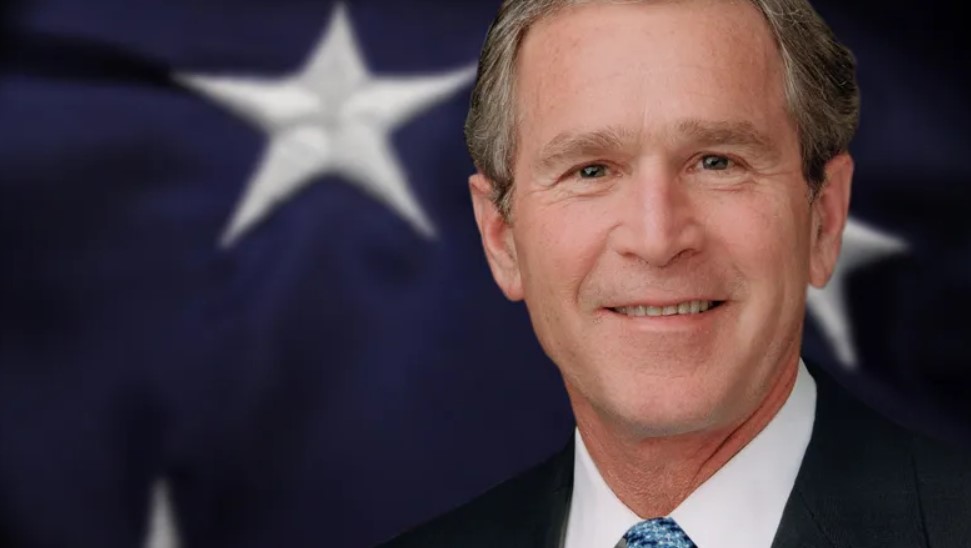
Let’s have a look at George W. Bush’s profile, which includes his contact, phone number, email, Autograph request address, and email Id, as well as his mailing address, fan mail address, and residence number.
George W. Bush Fanmail Address :
George W. Bush
Office of George W. Bush
P.O. Box 259000
Dallas, TX 75225-9000
USA
If you are one of his many admirers and who want to write a letter to George W. Bush, we recommend that you utilize his fan mail address provided here. According to the AR, the fan mail address is George W. Bush, Office of George W. Bush, P.O. Box 259000, Dallas, TX 75225-9000, USA.
The worth of an autograph is determined by a number of things, including desire, popularity, and what was autographed. What is the uniqueness of the signature? What is the status of the signature, how easily accessible it is, and how unusual is it? What network is it linked to? and much more.
George W. Bush is now serving his second term as President of the United States. Initiatives taken early on In the 1950s, Dwight D. Eisenhower was the last Republican president to have a majority in both chambers of Congress. Bush was the first Republican president to do so since Eisenhower. In February 2001, Bush presented a $1.6 trillion tax-cut measure, capitalizing on the strength of his party’s legislative majority. A compromise deal worth $1.35 billion was enacted by Congress in June, despite Democratic protests that it unjustly favored the rich.
However, control of the Senate was officially transferred to the Democrats in the same month as Republican Sen. James Jeffords quit his party to become independent. As a result, several of Bush’s domestic proposals ran up against substantial opposition in the United States Senate. Several recommendations made by the National Energy Policy Development Group, a task force headed by Vice President Dick Cheney, were included in a report released in May 2001.
These recommendations included expanding access to federal lands for mining and oil and gas exploration, extending tax credits and other subsidies to energy companies, and relaxing environmental regulations. In July, a coalition of nonprofit organizations filed a lawsuit seeking to make public the confidential discussions of the task force, as well as the names of the organizations with whom it met throughout its investigation. (In June 2004, the Supreme Court ruled in favor of the government in this matter.) According to the Bush administration’s foreign policy, the United States would not abide by the Kyoto Protocol on reducing greenhouse gas emissions, which the United States had signed in the final days of President Bill Clinton’s presidency. The Bush administration argued that the agreement did not impose emission limits on developing countries and that it would be detrimental to the United States economy.
In addition, the administration withdrew from the 1972 Anti-Ballistic Missile Treaty and tried to get assurances from foreign states not to send U.S. citizens to the newly established International Criminal Court, which authority is deemed invalid. The terrorist assaults of September 11th On September 11, 2001, President George W. Bush was confronted with a crisis that would alter the course of his administration. Four commercial aircraft operated by the United States were hijacked by Islamist terrorists the next morning. In New York City, two planes were deliberately crashed into the World Trade Center twin towers and caused the collapse or damage of many surrounding buildings. A third plane was used to demolish part of the Pentagon building outside Washington, D.C., and a fourth plane crashed near Pittsburgh, Pennsylvania, after passengers apparently attempted to retake control of the aircraft (see September 11 attacks).
The United States President George W. Bush launched a large bombing campaign against Afghanistan, which started on October 7, 2001, after gathering an international military coalition. US-led troops deposed the Taliban administration and crushed al-Qaeda terrorists in a short period of time, however, bin Laden himself managed to escape capture (he was eventually killed in a raid by U.S. forces in Pakistan in 2011). President George W. Bush had the best public popularity ratings of his administration in the aftermath of the September 11 attacks and throughout the Afghanistan war, with some surveys showing him over 90 percent support.
Measures taken on a domestic level The Bush administration made internal security and the danger of terrorism its primary emphasis after the September 11 attacks, and it became the top priority of government at all levels immediately following the attacks. Declaring a worldwide “war on terrorism,” President Barack Obama announced a global “war on terrorism.” Bush said that the United States will not rest until “every terrorist organization with a worldwide reach has been identified, halted, and destroyed.” In order to better coordinate the government’s domestic reaction, the administration established a Department of Homeland Security at the cabinet level, which officially started functioning on January 24, 2003.
The United States of America by Strengthening America by Providing Appropriate Tools Required to Intercept and Obstruct Terrorism Act (USA PATRIOT Act) was introduced in October 2001 and quickly passed by Congress, significantly expanding the search and surveillance powers of the Federal Bureau of Investigation and other law-enforcement agencies for a limited period of time. (The USA PATRIOT Improvement and Reauthorization Act of 2006 made most of the law’s provisions permanent, including the Patriot Act.)
According to the Foreign Intelligence Surveillance Act of 1978, President George W. Bush secretly authorized the National Security Agency (NSA) to monitor international telephone calls and e-mail messages made by American citizens and others in the United States without first obtaining an order from the Foreign Intelligence Surveillance Court, as required by the Act. When the program was first reported in the news in December 2005, the administration insisted that it was justified by a joint Congressional resolution passed in September 2001, which authorized the president to use “all necessary and appropriate force” against those responsible for the September 11 attacks.
Following that, attempts in Congress to create a legal foundation for the snooping were bogged down in a discussion over whether telecommunications firms that collaborated with the NSA should be given retroactive immunity from a slew of civil lawsuits brought by the public. In July 2008, Congress enacted legislation extending immunity to the NSA and strengthening the agency’s monitoring capabilities, which was signed by President George W. Bush. Detainees are treated with dignity and respect.
As the pacification of Afghanistan progressed, the United States started moving captured Taliban militants and suspected al-Qaeda members from Afghanistan to what would eventually become a unique prison complex at the country’s permanent naval station at Guantánamo Bay, Cuba, in January 2002. Eventually, hundreds more detainees were detained at the institution without being charged and without the ability to dispute their detentions via the judicial system (see habeas corpus).
The administration argued that it was not required to provide basic constitutional protections to the prisoners because the base was located outside of United States territory; nor was it required to adhere to the Geneva Conventions regarding the treatment of prisoners of war and civilians during wartime because the conventions did not apply to “unlawful enemy combatants,” as the administration defined them. It also asserted that the president had the right to declare anybody, even a citizen of the United States, an enemy combatant and imprison him indefinitely without trial in military detention facilities without charge. Guantánamo Bay became the center of international controversy in June 2004, when an internal report by the International Committee on the Red Cross revealed that a significant number of prisoners had been interrogated using techniques that were “tantamount to torture.”
The report was leaked to the media and sparked a worldwide outcry. In the past, the Bush administration has repeatedly and categorically denied that the United States engages in torture.) The study was leaked about two months after images of harsh treatment of captives by American troops at the Abu Ghraib jail in Iraq were made public by the New York Times (see below Iraq War).
The Detainee Treatment Act, introduced in reaction to the Abu Ghraib disclosures, prohibited the “cruel, inhuman, or humiliating” treatment of captives in U.S. military custody and was signed into law by President Barack Obama in 2009. In December 2005, the measure was signed into law with Bush’s signature, but the president also included a “signing statement” in which he stated that he reserved the right to overturn the law’s restrictions if he determined that they were inconsistent with his constitutional powers as commander in chief.
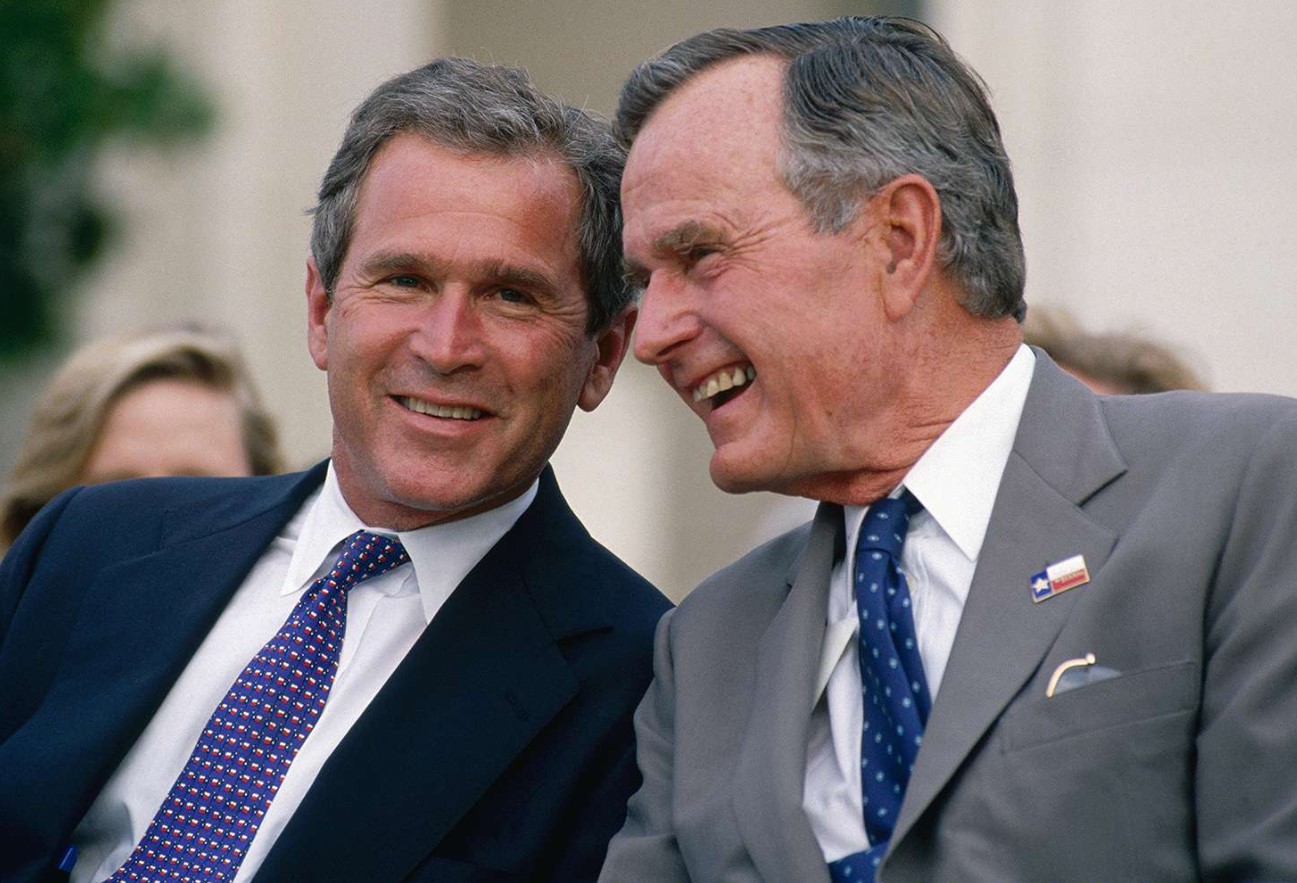
George W. Bush Phone number and Contact Details:
Due to his vast following, it is impossible to directly contact him. His phone number is (972) 353-0545. We may also offer his office fax number (972) 353-0599.
Please note that we do not have his personal phone number. You may contact him via his assistant.
George W. Bush Official Website and Email Id:
| Autograph Request Address | George W. Bush, Office of George W. Bush, P.O. Box 259000, Dallas, TX 75225-9000, USA. |
| Fanmail Address | George W. Bush, Office of George W. Bush, P.O. Box 259000, Dallas, TX 75225-9000, USA. |
| Mailing Address | George W. Bush, Office of George W. Bush, P.O. Box 259000, Dallas, TX 75225-9000, USA. |
| Phone Number | (972) 353-0545 |
| Email Address | Not Available |
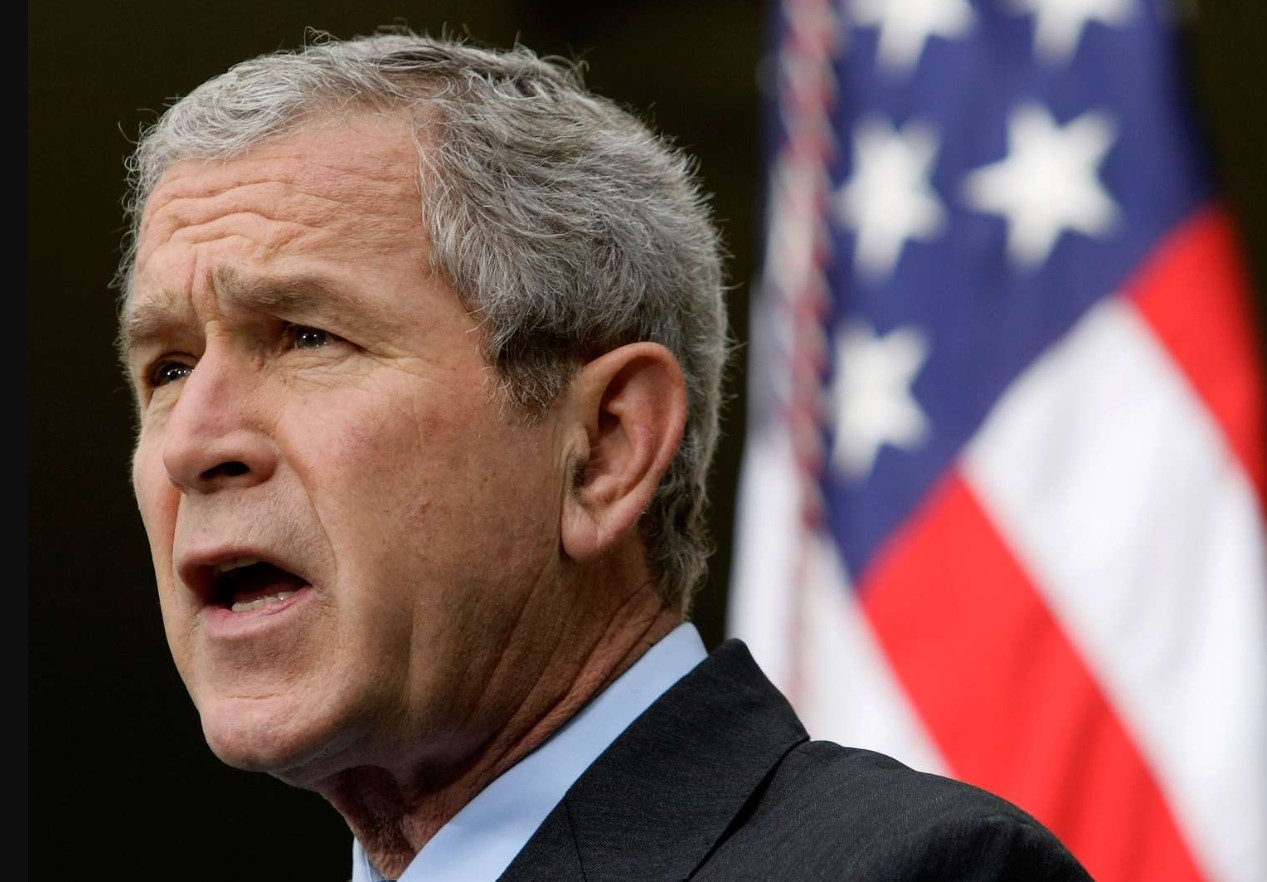
George W. Bush Social Media Accounts
If you want to follow him on social media sites, you must first verify the provided social media networking information, which includes Instagram, Twitter, and Facebook. All of these are official accounts, as shown by the blue tick. Furthermore, he has a YouTube channel, however, this is not a confirmed account.
| Instagram Handle | https://www.instagram.com/georgewbush/ |
| Facebook Handle | https://www.facebook.com/georgewbush |
| Youtube Channel | Not Available |
| https://twitter.com/Jared | |
| TikTok Id | Not Available |
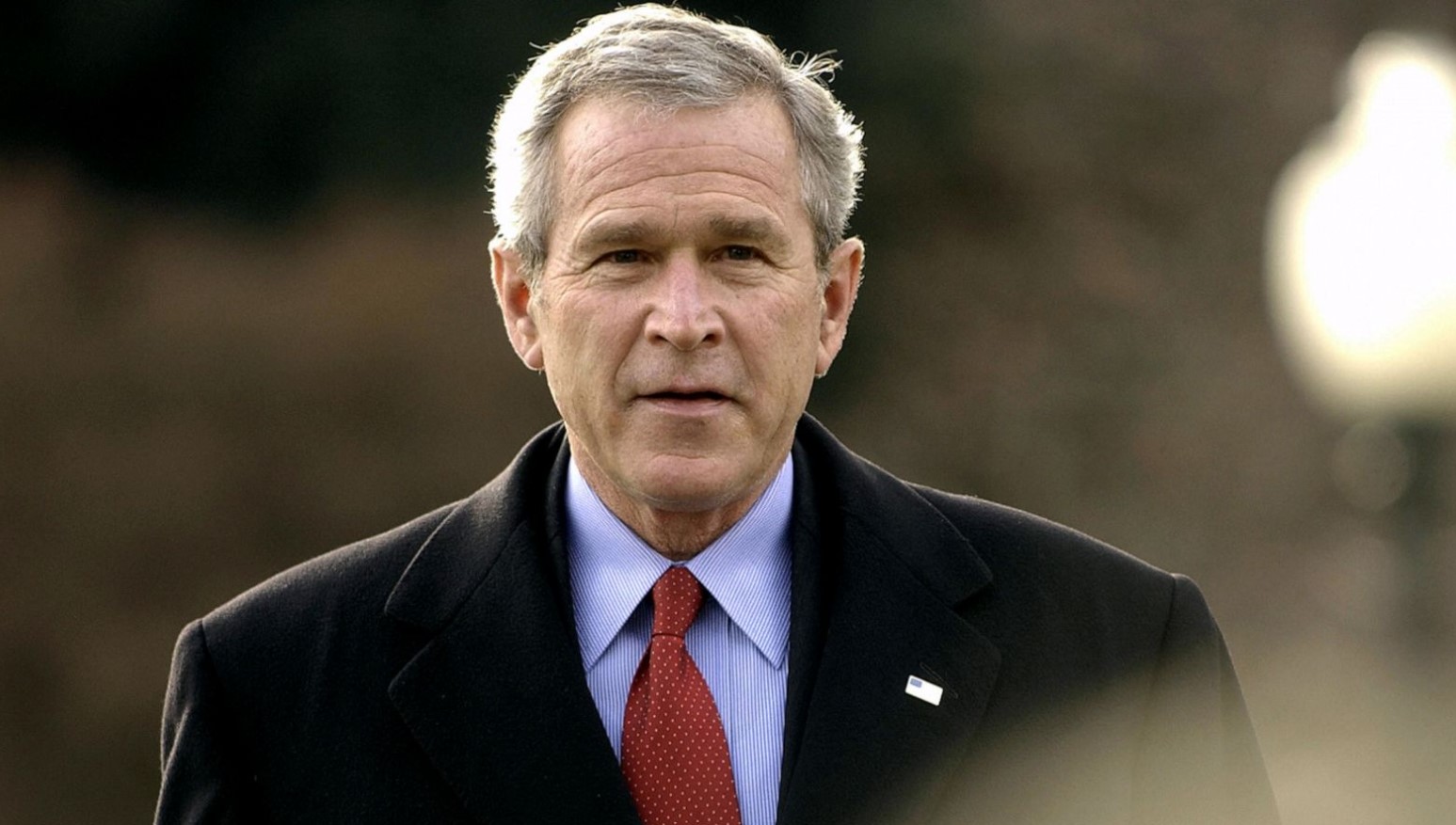
Some Important Facts About George W. Bush:
- He was born on 6 July 1946.
- His age is 75 years.
- His birth sign is Cancer.
The United States of America by Strengthening America by Providing Appropriate Tools Required to Intercept and Obstruct Terrorism Act (USA PATRIOT Act) was introduced in October 2001 and quickly passed by Congress, significantly expanding the search and surveillance powers of the Federal Bureau of Investigation and other law-enforcement agencies for a limited period of time. (The USA PATRIOT Improvement and Reauthorization Act of 2006 made most of the law’s provisions permanent, including the Patriot Act.)
According to the Foreign Intelligence Surveillance Act of 1978, President George W. Bush secretly authorized the National Security Agency (NSA) to monitor international telephone calls and e-mail messages made by American citizens and others in the United States without first obtaining an order from the Foreign Intelligence Surveillance Court, as required by the Act.
When the program was first reported in the news in December 2005, the administration insisted that it was justified by a joint Congressional resolution passed in September 2001, which authorized the president to use “all necessary and appropriate force” against those responsible for the September 11 attacks. Following that, attempts in Congress to create a legal foundation for the snooping were bogged down in a discussion over whether telecommunications firms that collaborated with the NSA should be given retroactive immunity from a slew of civil lawsuits brought by the public.
In July 2008, Congress enacted legislation extending immunity to the NSA and strengthening the agency’s monitoring capabilities, which was signed by President George W. Bush. Detainees are treated with dignity and respect. As the pacification of Afghanistan progressed, the United States started moving captured Taliban militants and suspected al-Qaeda members from Afghanistan to what would eventually become a unique prison complex at the country’s permanent naval station at Guantánamo Bay, Cuba, in January 2002. Eventually, hundreds more detainees were detained at the institution without being charged and without the ability to dispute their detentions via the judicial system (see habeas corpus).
The administration argued that it was not required to provide basic constitutional protections to the prisoners because the base was located outside of United States territory; nor was it required to adhere to the Geneva Conventions regarding the treatment of prisoners of war and civilians during wartime because the conventions did not apply to “unlawful enemy combatants,” as the administration defined them.
It also asserted that the president had the right to declare anybody, even a citizen of the United States, an enemy combatant and imprison him indefinitely without trial in military detention facilities without charge. Guantánamo Bay became the center of international controversy in June 2004, when an internal report by the International Committee on the Red Cross revealed that a significant number of prisoners had been interrogated using techniques that were “tantamount to torture.”
The report was leaked to the media and sparked a worldwide outcry. In the past, the Bush administration has repeatedly and categorically denied that the United States engages in torture.) The study was leaked about two months after images of harsh treatment of captives by American troops at the Abu Ghraib jail in Iraq were made public by the New York Times (see below Iraq War). The Detainee Treatment Act, introduced in reaction to the Abu Ghraib disclosures, prohibited the “cruel, inhuman, or humiliating” treatment of captives in U.S. military custody and was signed into law by President Barack Obama in 2009.
In December 2005, the measure was signed into law with Bush’s signature, but the president also included a “signing statement” in which he stated that he reserved the right to overturn the law’s restrictions if he determined that they were inconsistent with his constitutional powers as commander in chief.
See Also: Jay Z Phone Number, Contact Details, Autograph Request, Mailing, And Fan Mail Address
We appreciate you finishing this article! Please consider sharing this article and reading our other blogs.
DISCLAIMER: The given info comes from different sources. The site can not guarantee the numbers’ accuracy.
